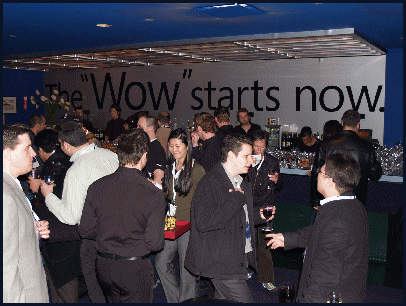Reporter’s Notebook: NEW YORK — The bathroom attendant at Cipriani, where Microsoft hosted the
first of two events to celebrate the consumer launch of its long-awaited Vista
operating system (OS), had a copy of Samuel Beckett’s Waiting For
Godot propped up on his chair.
I didn’t want to break it to him that Godot never shows up. A bathroom
attendant reading an existentialist classic seemed like one of those “only
in New York” moments. But while computer and chip makers such as Intel , AMD
, Dell
and HP
could have been stand-ins for Vladimir and Estragon, Vista finally did show up.
The hardware guys are hoping it was worth the wait.
Todd Bradley, executive vice president of the personal systems group at HP,
seemed to be speaking for all of them when he said in an aside to Microsoft
CEO Steve Ballmer, “I hope your forecasts are right.”
I asked Ballmer if there was a date for the first Vista service pack.
“No,” he said, laughing. “The goal is not to need one.”
The scene then shifted to MTV studios in Times Square, where a trio of
tattooed percussionists tried in vain to get reactions from the decidedly
unenthusiastic crowd, even failing to get anyone to catch the drumsticks
they flipped into the standing-room-only VIP and press crowd.
Maybe we couldn’t catch the drumsticks because we were all holding plates
loaded with shrimp cocktails, succulent roast beef and other delectable items.
When Gates took the stage, he was not content to sing the
praises of Vista, which he did. But he also wanted to make sure everyone
remembered that the Windows products he championed were the truly important
breakthroughs.
He noted that Microsoft committed itself to using a graphical user interface
(GUI) in 1983 — incidentally, the same year that Apple released Lisa, the first personal
computer with a GUI.
At the time, he said, Microsoft predicted that Windows “would become the
platform the software industry would build on and unleash an opportunity for
our hardware partners to do amazing things.
“Twelve years after [the release of Windows 95], finally we could say
our vision of graphics interface had succeeded.”
He went on to list a series of innovations nurtured by Microsoft, including
fonts, the Internet browser and what he and Ballmer described as “the
digital lifestyle.”
“So Windows 95 was the key to [that] era, and Windows Vista is key to the
era we have today,” Gates concluded. The trouble with this version of software industry history is that objective observers remember it differently.
 |
The crowd takes in the ‘wow.’ |
Directions on Microsoft lead analyst Greg DeMichillie said that what
Microsoft has really done is take technology developed by other people and
then popularized it and made it broadly available. “Netscape was out with a browser a long time before Microsoft
even had one.”
So how come Microsoft tries to take credit for these things?
“It’s almost like they’re embarrassed that their role is popularizing. It’s
not the same thing as inventing something, but there is a value to that,”
DeMichillie told me.
Well, what about Vista?
“It’s an improvement over XP.”
Yes, but is it innovative?
“It’s still a long way from what Apple is
delivering.”
Rebecca Wettemann of Nucleus Research told me that, just as IBM missed the software revolution, Microsoft is in the process
of missing the Internet revolution.
“You have to ask the question, ‘Are we seeing Microsoft moving from
dominance to irrelevance?'” she said.
Probably not in the short term. As Microsoft likes to say, “The Wow is Now.”
Ballmer joined Gates on stage, having
swapped his business suit for a pair of slacks and a red V-neck sweater. The unusual sighting of the pair of honchos sharing the spotlight was enough
to create a mini-media crush.
Gates is taking his final bows, Vista is still in its infancy, and Microsoft
executives are entitled to bask in its glow, even if it turns out to be a
sunset they aren’t even aware is happening.
“Big companies don’t see things until they become a big deal,” DeMichillie
said. “It’s something Microsoft has to worry about. Is there some seed
of an idea that could grow into a huge business that they might miss?”
Michael Hickins is a senior editor for internetnews.com.


